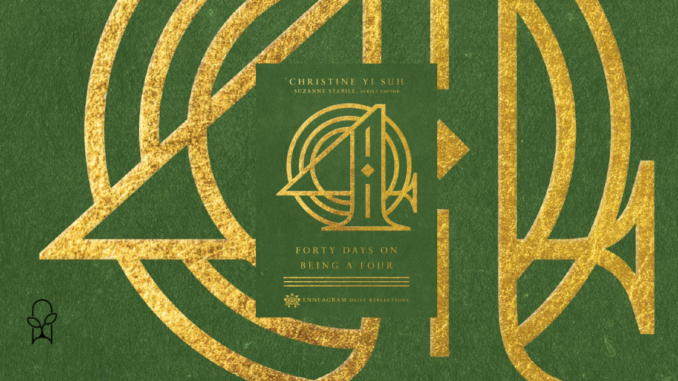
Series: Enneagram Daily Reflections #4
Published by IVP on May 4, 2021
Genres: Non-Fiction, Christian Life, Devotional, Memoir
Buy on Amazon
Goodreads

How are you feeling? Christine Yi Suh says that this has always been a hard question. She writes: The more accurate question for a Four may be, 'What aren't you feeling?' I can grab my prevailing emotion and tell you how I'm doing from that emotion's point of view (joy, elation, sadness, grief, confusion--you name it!). I live and breathe a kaleidoscope of living, feeling, conflicting emotions. Many times Fours are labeled emotionally intense or too much, but for a Four this is just how life is. This is why Fours are ideal companions in the midst difficult times: the death of a loved one, the birth of a baby, transitional seasons in career, relational conflict, and so on. The Enneagram is a profound tool for empathy, so whether or not you are a Four, you will grow from your reading about Four and enhance your relationships across the Enneagram spectrum. Each reading concludes with an opportunity for further engagement such as a journaling prompt, reflection questions, a written prayer, or a spiritual practice.
Forty Days on Being a Four shares brief reflections about how Christians who type as Fours in the Enneagram personality system can move towards a state of emotional and spiritual health in their everyday lives. The daily readings are typically two or three pages long, and are quick perspectives based on the author’s experiences, ending with reflection questions or personal practices that readers can consider. Instead of being a collection of essays from different Enneagram Fours, this is all written by a single author, Christine Yi Suh. She draws on her personal background as a Korean American woman, and shares reflections based on the intersections between her personality type and her cultural experiences.
Personal Evaluation
My introduction to this series was Forty Days on Being a Nine by Marlena Graves. I type as an Enneagram One, but Nine is my wing type, and I deeply connected with Graves’s writing, which perfectly balanced personal illustrations with general themes that anyone with the same core desires and motivations could relate to. I was excited to read Forty Days on Being a Four as well, since I relate to Fours and originally mistyped myself as one, but I ended up not relating to this book as much as I had expected to. Instead of reading like a collection of general reflections about being a Four, this book reads like a memoir about being a Korean American female pastor. I found the author’s story and perspectives interesting, but this was much less relatable than I had expected.
I appreciated the Asian American elements of this book with specific friends in mind, and enjoyed learning more about Korean culture, but the author did not adequately balance her unique experiences as a Korean American with the more general elements of her personality type. Since writers and speakers often present the Enneagram from a very white American perspective, I think it is great for this series to come from the perspectives of people from marginalized groups, but I don’t think that the execution was successful here. Readers who are interested in the concept of Forty Days on Being a Four aren’t necessarily interested in a personal memoir about another Four’s extremely specific life experiences, regardless of that author’s background.
Audience Considerations
This is an overtly Christian book, but even though someone can describe it as a devotional, only some of the readings directly incorporate Scripture. The short readings are perfect for busy people who don’t have time to fit a longer book into their day, but if someone is looking for a Bible-based devotional, they should use this as supplementary reading. Also, potential buyers should know that this book does not offer a detailed explanation of the Enneagram system or this specific type. If someone who is excited about this personality system wants to share it with their loved ones, I would encourage them to gauge people’s interest and start elsewhere, with a general introduction to this system and the blessings of self-understanding that it can bring. Instead of explaining or persuading, the authors in this series speak to people who are already invested in the Enneagram system.
I would recommend this book to people who would like to read about the author’s unique perspective and personal reflections about her life. If someone is a Korean American Four, I would definitely recommend this to them, and I think that it could be a huge encouragement for them to identify with the author’s personality type from within the same background. However, this is a memoir above all else, not a general guide to understanding this personality. If someone is specifically looking for ways to understand themselves as a Four, they may find this book and its various reflection prompts helpful, but they should know that the author filters everything through very specific personal experiences, and that other Fours may not connect with this unless they relate to her.
